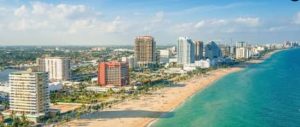Fort Lauderdale
The area that is now Fort Lauderdale was originally inhabited by the Tequesta Native American tribe, who lived along the southeastern coast of Florida for thousands of years.
The first European contact with the area occurred in the 16th century when Spanish explorers, including Juan Ponce de León, explored the Florida coast. However, it was not until the 19th century that permanent settlements began to appear in the region. We are available 24/7 to provide you limo service in Ft. Lauderdale.
In the early 1800s, the United States acquired Florida from Spain, and the Seminole Wars in the mid-1800s played a significant role in opening up the area for settlement.
The wars resulted in the removal of Native American tribes, including the Seminole, and paved the way for pioneers and settlers to establish homesteads and towns.
Ft Lauderdale itself was founded in 1838 during the Second Seminole War. Major William Lauderdale led a group of Tennessee Volunteers to construct a fort along the New River as part of the United States government’s efforts to establish a network of forts throughout Florida. However, the fort was short-lived and abandoned just a few years later.
Throughout the 19th century, the region remained relatively sparsely populated, primarily used for agriculture, including growing citrus fruits, and as a stopover for travelers moving between Miami and Palm Beach.
In the early 20th century, Fort Lauderdale experienced a significant boom with the extension of the Florida East Coast Railway in 1896 and the completion of the Intracoastal Waterway in 1928. These transportation improvements opened up the area for tourism and development.
During World War II, Fort Lauderdale played a crucial role as a training base for the U.S. Navy, bringing an influx of military personnel to the area. After the war, many servicemen returned to Fort Lauderdale, contributing to its growth and the development of its tourism industry. Learn more about Fort Lauderdale airport and our limo service.
In the 1950s and 1960s, Fort Lauderdale gained a reputation as a popular spring break destination for college students, drawing large crowds and establishing its image as a vibrant and fun-loving city.
In recent decades, Fort Lauderdale has continued to evolve and diversify its economy. It has experienced urban revitalization projects, the growth of its cultural scene, and the expansion of its port, which has made it one of the busiest cruise ports in the world.
Today, Fort Lauderdale is a major city in South Florida, known for its beautiful beaches, boating, and water activities, arts and culture, and as a popular tourist destination. It has become a desirable place to live and visit, offering a mix of natural beauty, urban amenities, and a rich history.
Popular Places in Fort Lauderdale:
Fort Lauderdale is a vibrant city located on the southeastern coast of Florida, United States. Known for its beautiful beaches, thriving arts scene, and canal system, it is often referred to as the “Venice of America.” Here’s a description of some key aspects of Fort Lauderdale:
Beaches:
Fort Lauderdale boasts stunning sandy beaches along its coastline. The most famous beach is Fort Lauderdale Beach, which stretches for miles and offers crystal-clear waters, soft sand, and a lively atmosphere. Visitors can relax, sunbathe, swim, or engage in various water sports activities such as surfing, paddle boarding, and jet skiing.
Waterways:
One of the distinctive features of Fort Lauderdale is its intricate canal system. Dubbed the “Venice of America,” the city is intersected by numerous canals and waterways, making it a popular destination for boating enthusiasts. Boat tours, water taxis, and yachts are a common sight in Fort Lauderdale, and residents often enjoy waterfront living.
Las Olas Boulevard:
Located in downtown Fort Lauderdale, Las Olas Boulevard is a vibrant street filled with upscale shops, art galleries, restaurants, and cafes. It’s a popular destination for both locals and tourists, offering a blend of fine dining, trendy boutiques, and a lively nightlife scene.
Cultural Scene:
Fort Lauderdale is home to a thriving arts and cultural scene. The Broward Center for the Performing Arts hosts a wide range of events, including Broadway shows, concerts, and ballet performances. The city also has numerous art galleries, museums, and cultural festivals throughout the year.
Everglades:
Just a short drive from Fort Lauderdale, the Everglades National Park offers a unique and diverse ecosystem. Visitors can explore the vast wetlands, spot wildlife such as alligators and exotic birds, and take airboat rides for an adventurous experience.
Shopping:
In addition to Las Olas Boulevard, Fort Lauderdale offers a variety of shopping options. The Galleria at Fort Lauderdale is a popular upscale mall featuring high-end retailers, while the Sawgrass Mills Mall, located nearby, is one of the largest outlet malls in the United States, offering discounted prices on a wide range of brands.
Cruise Port:
Fort Lauderdale is known as the “Cruise Capital of the World” due to its bustling cruise port. Port Everglades serves as a major embarkation point for numerous cruise lines, making it a popular starting point for Caribbean cruises.
Overall, Fort Lauderdale is a dynamic city that combines beautiful beaches, a thriving cultural scene, and a unique waterway system. Its warm climate and welcoming atmosphere make it an attractive destination for tourists and a desirable place to live for residents.
